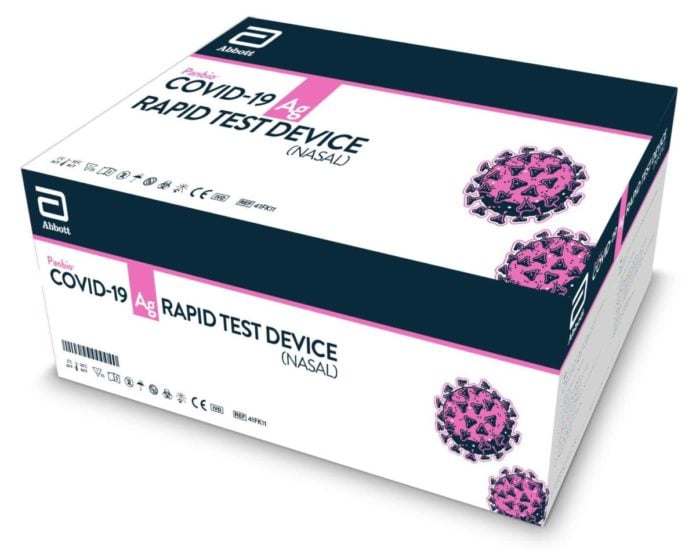Efforts to ramp up COVID-19 testing capacity in the Philippines have received fresh impetus, with the Office of the Civil Defense (OCD) procuring and distributing the Abbott Panbio™ COVID-19 Ag Rapid Test Device for the detection of the SARS-CoV-2 virus in people suspected of having COVID-19. The procurement of 500,000 Panbio rapid antigen tests is part of the OCD’s COVID-19 response to the pandemic and is in addition to purchases by LGUs (Local Government Units) to meet local testing needs. Forty-five hospitals and LGUs in Metro Manila and nearby provinces recently received these tests procured by the OCD.
Along with the newly introduced lab-based SARS-CoV-2 IgG II (Immunoglobulin G) quantitative antibody test for helping measure and understand an individual’s immune response, Abbott’s COVID-19 tests offer a range of solutions to serve evolving testing needs in the country.
Abbott’s COVID-19 test portfolio helps healthcare professionals detect the virus at all stages of its life cycle, with tests performed in the lab, as well as rapid tests done at the point of care. As the country strengthens testing efforts, the availability of these two testing technologies provides reliable testing for active infections, aids in contact tracing and provides insights about how people react to COVID-19 infection and vaccination by measuring the body’s immune response.
Vince Dizon, Deputy Chief Implementer of the National Action Plan Against COVID-19, said: “The Abbott Panbio antigen test, which has received WHO (World Health Organisation) Emergency Use Listing, will greatly help us quickly detect positive cases within minutes and allow for faster tracing and isolation as we battle this wave of infections.”
Over the coming months, Abbott expects to provide millions of COVID-19 tests to the Philippines. In 2020, Abbott shipped 400 million COVID-19 tests worldwide.
Quick, reliable COVID-19 tests with patient-friendly nasal swab
The Panbio COVID-19 Ag Rapid Test Device is a lateral flow assay for the rapid, qualitative detection of the SARS-CoV-2 virus. The test is a reliable, affordable, and scalable option for large-scale testing in a variety of community settings. Panbio COVID-19 Ag is CE-Marked and has received WHO Emergency Use Listing (EUL).
Individuals have the option of a nasal swab for the collection of specimens, making the process less invasive and more convenient. The test – which is authorized for use by healthcare professionals – requires no instrumentation and provides results as early as 15 minutes. Negative results do not preclude COVID-19 infection and cannot be used as the sole basis for treatment or other management decisions.
The ongoing fight against COVID-19 in the country calls for an efficient diagnostic tool that can enable decentralized testing. Abbott’s fast, user-friendly Panbio COVID-19 Ag test can significantly improve efforts to control the transmission of COVID-19 in the Philippines.
“Our country needs innovative weapons to control this latest surge in COVID-19 infections – a rapid, reliable and easy-to-administer COVID-19 test that can be scaled is a key tool for expanding testing,” said UP-Philippine General Hospital Medical Research Laboratory Chief, Dr. Januario Veloso. “Given the urgency, the need for short turnaround times and opportunities for expanding decentralized testing, tests such as the Panbio rapid antigen tests can strengthen public health efforts to control the transmission of the coronavirus.”
Results from a clinical study by Abbott of 508 samples demonstrated that Panbio COVID-19 Ag with a nasal swab has a 98.1% sensitivity and 99.8% specificity on people who were suspected of exposure to COVID-19 or had symptoms in the last seven days.[
“Abbott is committed to bringing a range of reliable and convenient COVID-19 tests to the Philippines, especially the Greater Manila Area, as quickly as possible,” said Sanjeev Johar, divisional vice president, Abbott’s rapid diagnostics business in Asia Pacific. “Our pioneering technologies provide fast, accurate point-of-care COVID-19 testing and help scale diagnostic capability, bringing it closer to millions of Filipinos.”
Evaluating immune response with Abbott’s IgG serology testing
As Philippines joins many other countries around the world in the authorization and the distribution of COVID-19 vaccines, it is important for healthcare professionals and researchers to assess how individuals and communities are responding to vaccination. This is where Abbott’s quantitative SARS-CoV-2 IgG II antibody test may help in determining and monitoring a person’s immune response to vaccines, including research to determine how long a response may last.

Abbott’s scientists designed the quantitative IgG II test to detect the spike protein of the SARS-CoV-2, which plays an important part in how the virus enters the cells. As the body develops an immune response, antibodies develop and bind to the spike portion of the virus in order to block the protein and ultimately prevent infection. Several vaccines are designed with the spike protein to trigger that same immune response. Research has also shown a correlation between rising IgG levels that target the spike protein, such as those in Abbott’s quantitative test, and rising levels of neutralizing antibodies, or the specific antibodies that block infections.
A study to determine the clinical performance of Abbott’s SARS-CoV-2 IgG II Quant test on its Alinity i instrument found it had 99.60% specificity (ability to exclude false positives) and 99.35% sensitivity (ability to exclude false negatives) in patients tested 15 days or more after symptoms began.
“As COVID-19 vaccination becomes more widespread, Filipinos may need reassurance that the vaccine is generating an immune response, and many would want to understand how long the immune response lasts. Tests such as the IgG II quantitative assay may help provide more insight to doctors and scientists,” said Prof Dr. Januario Veloso.
Delivering reliable results quickly, Abbott’s COVID-19 testing options in the Philippines demonstrate high specificity and sensitivity. They can be used by healthcare professionals in various settings, helping curb infection surges, along with providing greater knowledge about the coronavirus as it continues to evolve.
